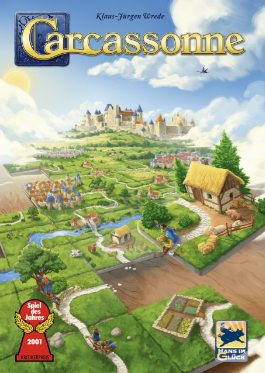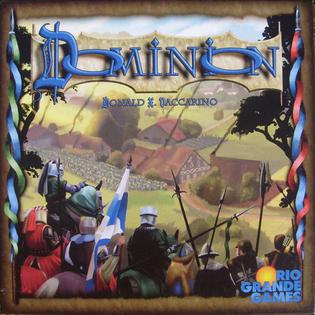Catan: Cities & Knights, formerly The Cities and Knights of Catan, is an expansion to the board game The Settlers of Catan for three to four players. It contains features taken from The Settlers of Catan, with emphasis on city development and the use of knights, which are used as a method of attacking other players as well as helping opponents defend Catan against a common foe. Cities & Knights can also be combined with the Catan: Seafarers expansion or with Catan: Traders & Barbarians scenarios.

Mahjong or mah-jongg is a tile-based game that was developed in the 19th century in China and has spread throughout the world since the early 20th century. It is played by four players. The game and its regional variants are widely played throughout East and Southeast Asia and have also become popular in Western countries. The game has also been adapted into a widespread online entertainment. Similar to the Western card game rummy, mahjong is a game of skill, strategy, and luck. To distinguish it from mahjong solitaire, it is sometimes referred to as mahjong rummy.

Carcassonne is a tile-based German-style board game for two to five players, designed by Klaus-Jürgen Wrede and published in 2000 by Hans im Glück in German and by Rio Grande Games and Z-Man Games (currently) in English. It received the Spiel des Jahres and the Deutscher Spiele Preis awards in 2001.

Golf is a card game where players try to earn the lowest number of points over the course of nine deals.

Rummy is a group of games related by the feature of matching cards of the same rank or sequence and same suit. The basic goal in any form of rummy is to build melds which can be either sets or runs and either be first to go out or to amass more points than the opposition.

Rummikub is a tile-based game for 2 to 4 players, combining elements of the card game rummy and mahjong. There are 106 tiles in the game, including 104 numbered tiles and two jokers. Players have 14 or 16 tiles initially and take turns putting down tiles from their racks into sets of at least three, drawing a tile if they cannot play. In the Sabra version, the first player to use all their tiles scores a positive score based on the total of the other players' hands, while the losers get negative scores. Variations of the game contain four jokers. An important feature of the game is that players can move and reuse the tiles that have already been placed on the table.

Craits is a shedding card game for two to five players. It was invented in the 1970s in Cambridge, Massachusetts, and is derived from Crazy Eights, which forms the origin of its name.
StarCraft: The Board Game, published by Fantasy Flight Games, is a game inspired by the 1998 computer game StarCraft. Players take control of the three distinctive races featured in the video games, the Terrans, the Protoss, or the Zerg, to engage in battle across multiple worlds in order to achieve victory. Each of the three races features a fairly different playing style. A prototype of the game was shown in BlizzCon 2007, with pre-release copies sold at Gen Con 2007 and Penny Arcade Expo 2007. It was publicly released in October 2007.
The Catan Card Game, originally named The Settlers of Catan: The Card Game, is a card-game adaptation of The Settlers of Catan board game. It is a member of the Catan series of games developed by Klaus Teuber and published by Kosmos in German, and by Mayfair Games in English. The Catan Card Game is a two-player game, although the rules can be accommodated as to allow players to share a set or for each player to have their own, as is intended for tournament play. Seven expansions of the Catan Card Game have also been released.

Four color cards is a game of the rummy family of card games, with a relatively long history in southern China. In Vietnam the equivalent game is known as tứ sắc.
Civilization: The Card Game is a card game designed by Civilization IV lead designer Soren Johnson, based on Civilization IV. It was developed in 2006 by Firaxis Games, as a bonus in the Sid Meier's Civilization Chronicles boxed set, and is not available independently.
Catan: Traders & Barbarians is the third expansion to the Settlers of Catan games, developed by Klaus Teuber. It contains a series of new scenarios and small variations, which are meant for two, three, or four players, with limited compatibility between the other two expansions, Catan: Seafarers and Catan: Cities & Knights. Three of the modules had been previously offered as "mini-expansions", though two have new rules in Traders. The expansion itself is named for one of the scenarios therein.

Dominion is a card game created by Donald X. Vaccarino and published by Rio Grande Games. Originally published in 2008, it was the first deck-building game, and inspired a genre of games building on its central mechanic. Each player begins with a small deck of cards, which they improve by purchasing cards from a common supply that varies from game to game. Cards can help the player's deck function, impede their opponents, or provide victory points. As of December 2022, fifteen expansions to the original Dominion have been released.
Buraco is a Rummy-type card game in the Canasta family for four players in fixed partnerships in which the aim is to lay down combinations in groups of cards of equal rank and suit sequences, there being a bonus for combinations of seven cards or more. Buraco is a variation of Canasta which allows both standard melds as well as sequences. It originated from Uruguay and Argentina in the mid-1940s, with apparent characteristics of simplicity and implications that are often unforeseeable and absolutely involving. Its name derives from the Portuguese word "buraco" which means “hole”, applied to the minus score of any of the two partnerships. The game is also popular in the Arab world, specifically in the Persian Gulf; where it is known as 'Baraziliya' (Brazilian). Another popular variation of Buraco is Italian.
Granada is a 2009 German-style board game developed by Dirk Henn and published by Queen Games. It is based on and heavily inspired by Henn's earlier game, the Spiel des Jahres-winning Alhambra. Due to its similar theme, it is published as a "standalone game in the Alhambra family".
Glenn Drover's Empires: The Age of Discovery is the first of the Glenn Drover's Empires board games, created by Glenn Drover.

7 Wonders is a board game created by Antoine Bauza in 2010 and originally published by Repos Production. Three decks of cards featuring images of historical civilizations, armed conflicts, and commercial activity are used in the card drafting game 7 Wonders. The game received critical success upon its release, and won numerous awards, including the inaugural Kennerspiel des Jahres connoisseurs' award in 2011.

Star Realms is a card-based deck-building science-fiction tabletop game, designed by Rob Dougherty and Darwin Kastle and published in 2014 by Wise Wizard Games. The game started out as a Kickstarter campaign in 2013. The goal of Star Realms is to destroy opponents by purchasing cards using "trade" points and using these cards to attack an opponent's "authority" using "combat" points. The game takes place in a distant future where different races compete to gain resources, trade and outmaneuver each other in a race to become ruler of the galaxy.

Faeria is a digital collectible card and turn-based strategy game that takes place on a dynamic playing board set in a fantasy universe. The game was developed by Abrakam, and released for desktop platforms in 2017, for Xbox One and Nintendo Switch in August 2020 and for PlayStation 4 in November 2020. The game was well received by critics, holding a score of 80/100 on reviews aggregation website Metacritic.
Mombasa is a 2015 Euro-style board game by Alexander Pfister. The theme is the rivalry of four trading companies in Africa. Players buy shares in the companies and expand them to their advantage, aiming to build the most valuable portfolio. Game mechanics include deck building and worker placement. Mombasa won the 2016 Deutscher Spielepreis.












